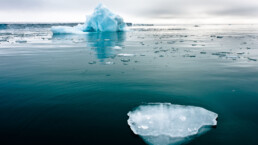Researchers sound the alarm over an “unprecedented ice-free” threat to the Arctic.
by Rebecca Falconer and Andrew Freedman, Axios
It’s too late to stop summer Arctic sea ice melting — even in a low-emissions scenario that caps global warming at a 1.5°C target in line with the Paris Agreement, according to a new study.
Why it matters: The peer-reviewed findings on the effects of human-caused climate change in the region, published in Nature Communications, suggest the first ice-free summer could be in the 2030s. That’s a decade sooner than previously projected.
Thought bubble: Many studies have projected when the Arctic sea ice would be seasonally ice-free, and all could be proven wrong given the nonlinearities and variability inherent in the Arctic climate system.

- One thing is for sure though, there are going to be surprises, many of them in a warmer, less ice-covered direction. Using different techniques to examine these questions is valuable, since the region is already heating up so quickly. That applies to the climate and geopolitics.
What they did: Researchers examined satellite data and climate models from 1979-2019 to see how Arctic sea ice has changed.
Recent Posts
“Arrest Now, Ask Questions Later”: Why Did L.A. ICE Agents Arrest and Jail U.S. Citizen Andrea Velez?
July 3, 2025
Take Action Now “They didn’t have vests that said ICE or anything. Their cars didn’t have license plates. … Just because of the color of our…
Trump’s Big, Beautiful Bill Is Naked Class War
July 3, 2025
Take Action Now Trump’s “Big, Beautiful Bill” trades tax cuts on millionaires for the dissolution of society.By Hamilton Nolan, In These Times…
Mayor Mamdani’s First Day, A Zero Hour Conversation With Richard Wolff
July 2, 2025
Take Action Now If elected, what would Mayor Mamdani do on his first day in City Hall? How would a democratic socialist govern as a big-city mayor?……
The U.S. Is Funding A Bloodbath At Gaza Aid Centers
July 2, 2025
Take Action Now The admin just gave $30M to GHF, the organization at the center of charges that Israel is weaponizing assistance and shooting at…




